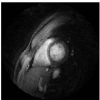Free Online Productivity Tools
i2Speak
i2Symbol
i2OCR
iTex2Img
iWeb2Print
iWeb2Shot
i2Type
iPdf2Split
iPdf2Merge
i2Bopomofo
i2Arabic
i2Style
i2Image
i2PDF
iLatex2Rtf
Sci2ools
104
click to vote
ISBI
2006
IEEE
2006
IEEE
Reconstruction of undersampled dynamic spiral MR images
The temporal resolution of dynamic MRI can be increased by sampling a fraction of k-space in an interleaved fashion, which causes spatial and temporal aliasing. We describe algebraically the aliasing process caused by spiral undersampling to formulate unaliasing as a set of independent inverse problems. Since each linear system is severely ill-conditioned, zeros are assumed in the solution. Specifically the size and the location of assumed zeros necessary for obtaining a unique solution is inspected. To overcome the problems of excessive memory and computation time needed for direct inverse computation, a fast implementation of the conjugate gradient (CG) method is proposed. Simulation using dynamic spiral cardiac images demonstrates improved temporal resolution of the proposed method.
Direct Inverse Computation | ISBI 2006 | Medical Imaging | Temporal Aliasing | Temporal Resolution |
Related Content
| Added | 20 Nov 2009 |
| Updated | 20 Nov 2009 |
| Type | Conference |
| Year | 2006 |
| Where | ISBI |
| Authors | Taehoon Shin, Jon F. Nielsen, Krishna S. Nayak |
Comments (0)

